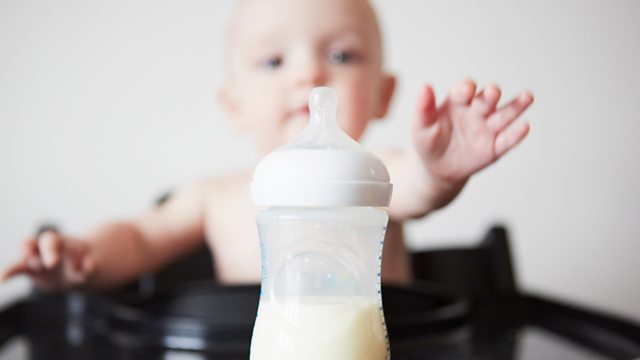Are too many babies being diagnosed with cows' milk allergy?
How can you tell if your baby really has an allergy to cows' milk?
Rashes, a runny nose and weird poos are all common in babies. Parents are sometimes told these symptoms mean their baby is allergic to cows milk and are prescribed low allergy formula or advised to avoid dairy if they are breastfeeding. Marijke Peters cut dairy out of her diet to try and help the gut problems her new baby Eva was having - but it made no difference and she's still trying to find out why she has blood in her poo.
Dr Robert Boyle sees babies with allergies in his clinic at St Mary's hospital in London. Those with a cows' milk protein allergy can safely drink low-allergy formula milk - but Dr Boyle thinks that more than the expected 1% of babies are being diagnosed with the allergy. So he looked at the number of prescriptions for these specialised formula milks dispensed in the UK, Norway and Australia. In the UK he says that ten times the number you'd expect to see are prescribed.
Professor Paula Moynihan who's Director of Food and Health at the University of Adelaide says these formula milks could pose a risk to children's teeth because they contain different sugars than the type found in milk - which bacteria in the mouth can feed on, making it more acidic and potentially damaging the teeth. She says that any babies given the dairy-free formulas should have their teeth brushed twice a day with a fluoride toothpaste and start seeing a dentist as soon as the first tooth appears.
Dr Margaret McCartney explains how long-Covid patients are going to extraordinary lengths to try unproven treatments in the hope that they will alleviate their symptoms. We hear how an investigation by the British Medical Journal uncovered how a special type of blood filtering called apheresis and hyperbaric oxygen therapy - costing thousands of pounds - are offered to long-Covid patients in European clinics but there is no evidence that they will help them. Margaret recommends instead signing up for NHS trials investigating potential treatments in a regulated way.
Gout is incredibly painful but many adults diagnosed with the condition aren't taking the recommended medication a year after they were told they had it. Dr Mark Russell from Kings College hospital in London found that only a third of people with gout were taking medication to help lower urate levels in their blood which can turn into crystals in the joints and organs like the kidneys if it is too high.
Last on
Broadcasts
- Tue 26 Jul 2022 21:00Βι¶ΉΤΌΕΔ Radio 4
- Wed 27 Jul 2022 15:30Βι¶ΉΤΌΕΔ Radio 4
Discover more health facts with The Open University
Can you detect health fact from fiction?
Podcast
-
![]()
Inside Health
Series that demystifies health issues, bringing clarity to conflicting advice.


